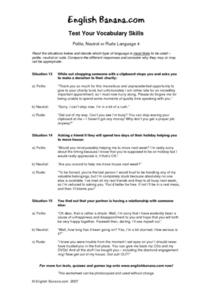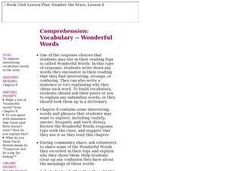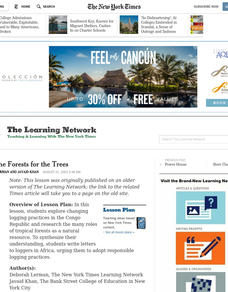It's About Time
Reflected Light
The lesson allows young scientists to use lasers and mirrors to study reflected light. A reading passage and homework question assess learning, while additional material introduces extension activities.
It's About Time
Curved Mirrors
Discover concave and convex mirrors using a laser light. Scholars experiment with real and virtual images before reading a handout and completing homework questions. Included extensions greatly benefit learners, so take advantage of the...
It's About Time
Refraction of Light
Don't shine like a diamond, refract light like a diamond. Young scientists use an acrylic block and a laser light to observe refraction. Advanced scholars figure the sine of the angles of reflection and incidence as well as mastering...
It's About Time
Elements and Compounds
Young scientists use electrolysis to separate water into its elements before experimenting with fire to learn about their properties. A helpful resource provides a reading passage and analysis questions.
It's About Time
States of Matter: Solid, Liquid, and Gas
Solid, liquid, and gas: they all matter. Scholars create an animation of the various states of matter, experiment with the temperature of water as it changes states, and observe carbon dioxide as it changes states. The lesson also...
It's About Time
Properties of Matter
Never trust an atom; they make up everything! Young chemists make modeling dough and add another ingredient to change the properties. Scholars then compare the properties of emulsion to composite materials. A reading passage and analysis...
Curated OER
Polite, Neutral Or Rude Language 4
In this language arts worksheet, 5th graders learn the difference between polite, neutral and rude responses to oral requests. Students read 3 situations and 3 possible responses. Students compare them and decide which is the most...
Curated OER
Electoral Process and Political Leadership
Students analyze voting issues. In this Bill of Rights lesson, students read articles regarding the election of 1824, government in ancient Rome, and lack of voter participation. Students discuss their impressions of each of the articles.
Curated OER
Writing Process
Students read "The Great Kapok" and choose to agree or disagree with the main character's decision. They gather and organize details from multiple sources to defend their standpoints. They begin prewriting steps of process writing.
Curated OER
Weather Log
Learners develop the skill of recording weather observations. Not only students be responsible for recording visual observations of the sky, but also collecting and recording weather instrument data.
Curated OER
Response to Literature: Feelings About the Book
Students read chapter 17 in the story NUMBER THE STARS and think about the author's purpose for writing the book. They are encouraged to share with the class their personal reactions to the story.
Curated OER
Drama-Dialogue
Use drama to study and practice dialogue. Creative minds discuss what dialogue tells about a character, and how it can be used to advance the plot. They read a play, think about what they gleaned from dialogue, and record their...
Curated OER
Introduction to E-Discussion
Here's an interesting way to incorporate technology into your classroom. Have your young readers conduct an e-discussion of a story they are currently reading. Learners can post and/or respond to the comments of others reading the same...
Curated OER
Comprehension: Vocabulary - Wonderful Words
While reading Chapter 8 of Number the Stars, learners write down any words they encounter in their reading that they find interesting, strange, or confusing. They record why they chose each word, and after completing the reading...
Curated OER
Dialogues Concerning Natural Religion
Spark Notes proves a useful tool in this online interactive quiz, designed for scholars reading David Hume's Dialogues Concerning Natural Religion. After responding to 21 multiple-choice reading comprehension questions, scholars get...
Achievement Strategies
CCSS Unit Design Template for Art
Art classes, like any lab class, require extensive preplanning and set-up time. Use this planning template in the quiet before the storm to identify the equipment and materials that will be needed, the procedures and processes...
Curated OER
American Colonies
Students record information in a database about the three American colonies. They are comparing and contrasting them. They are to log into a given database and fill in the corresponding sections. Once it is filled in the similiarities...
Curated OER
Biography Newsletters
Have your pupils just finished reading biographies? Extend their study by having them craft a biography newsletter about the subject of their biography. Using a word processor, they create, revise and edit their report, and add graphics...
Curated OER
First You Take an Ecumene
Although this was written regarding Canadian agriculture, it can be used in any agriculture or environmental science class. Learners evaluate agricultural and economic activity maps and consider land use competition. Activities that get...
Curated OER
Shakespeare's Macbeth
After reading Act II of The Tragedy of Macbeth, give your class this prompt to complete. One other question is listed along with information regarding the divine right of kings. A full plan is not written out here, but the prompt is a...
Curated OER
Nutrition
Young scholars determine which foods help keep our bodies healthy. They identify the six food groups and classify different food items into the correct categories of the food pyramid. They evaluate for one week the foods that they eat...
Curated OER
We Have a Dream
Students work as partners to study Dr. Martin Luther King's 'I Have a Dream' speech. In this African American history lesson, students work with their cross-grade partner to study, understand, and memorize the speech. Students meet with...
Curated OER
Where We Come From - A Culturally Responsive Writing Lesson
Students create a group poem. In this poetry lesson, students make a cultural poem titled "We Come From." They share their poems using the document camera and SMARTboard.
Curated OER
Seeing the Forests for the Trees
Students explore changing logging practices in the Congo Republic and research the many roles of tropical forests as a natural resource. To synthesize their understanding, students write letters to loggers in Africa, urging them to adopt...

























